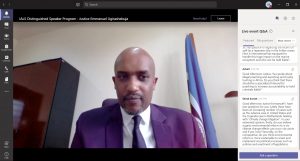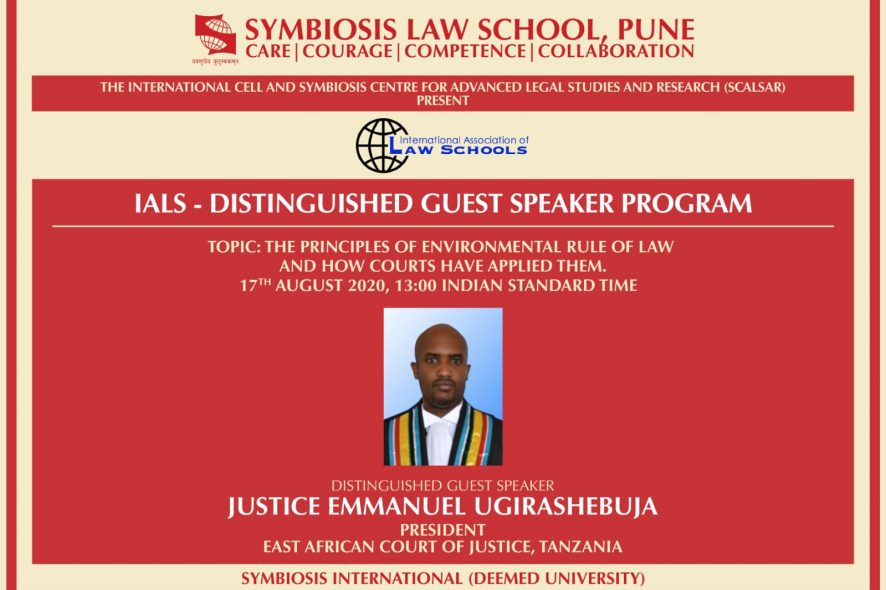Symbiosis Law School, Pune, a constituent of Symbiosis International (Deemed University), virtually hosted a Guest Lecture on August 17, 2020, at 1:30 pm. The lecture is under the aegis of the International Association of Law Schools Distinguished Speaker Program and was delivered by Justice Emmanuel Ugirashebuja, President, East African Court of Justice, Tanzania. The topic of the lecture was, ‘The Principles of Environmental Rule of Law and how Courts have applied them’.
Prof. Lasya Vyakarnam delivered the opening address with a short introduction to Symbiosis Law School, Pune and Symbiosis International (Deemed University). She then invited Dr. Shashikala Gurpur to deliver the welcome address and introduced Justice Emmanuel Ugirashebuja.
Dr. Shashikala Gurpur, Fulbright Scholar, Director, SLS-P and Dean Faculty of Law, SI(DU), provided an overview of the journey between Symbiosis Law School, Pune and the International Association of Law Schools. Dr. Gurpur introduced the IALS Distinguished Speakers Program, the novel virtual-learning initiative aimed at the internationalization of quality legal education. Lastly, she established the need to diversify the range of topics that form a part of current discourse, in light of the environment and its impacts being witnessed across the globe.
Justice Emmanuel Ugirashebuja began his lecture by establishing the transgression of planetary boundaries being caused by the human race. According to him, understanding urgency of the matter is of the utmost importance as is seen through tangible proof such as the Carbon Dioxide levels in the atmosphere exceeding 350 ppm, the large-scale biodiversity and forest cover loss and the increasing global temperatures.
In light of these dire circumstances, he says that he constantly finds himself asking the question, “What can judges do to positively impact humanity’s life support systems?”. According to him, it is imperative that judges abide by the principles of Rule of Law and cites 8 ingredients including accessibility, predictability, equality before the law, the lawful exercise of power, protection of human rights, speedy justice, and equal importance of the domestic and international law.
He spoke about the need for Constitutional guarantees of environmental protection in every country. He further elaborated on the similarity in constitutional judgments of the Indian Supreme Court and the African Court of Human Rights, both established the right to clean environment as a Fundamental Rights. He expressed his concern regarding the historically standing instructions of common law, which are rigid in their protection of people’s legal rights from environmental harms. He covered actions brought against the government and the competence of courts in their review of actions of governments. Lastly, he spoke about criminal actions against individuals harming the environment.

Elaborating further, he spoke about the procedural concerns around all forms of legal proceedings surrounding environmental issues. These included the jurisdiction, accessibility of courts, Public Interest Litigations and rigidity of precedent. However, Justice Emmanuel spoke of numerous cases in Uganda and the United Kingdom which have deviated from this rigidity and taken a liberal stance, in the interest of the environment and the protection of people’s rights, including creative interpretations by courts of countries such as India and New Zealand conferring legal rights to natural bodies such as rivers.
On jurisdictional issues, he spoke about the doctrine of forum non conveniens and gave the example of the Bhopal Gas Tragedy and the Southern District Court of New York State which did not admit a suit against Union Carbide Company. He also spoke about the Kafue river dispute and the interpretation of the European Court of Justice which waived the doctrine and allowed a British company to be sued in UK courts despite the origin of the suit being outside the territory of the UK.
Justice Emmanuel recounted his own experience as a judge in the Appellate Bench of the East African Court of Justice, which restricted the Tanzanian government from developing a super-highway cutting across the Serengeti National Park on environmental grounds. Additionally, he spoke about courts utilizing the Precautionary and Polluter Pays Principles to guarantee environmental protection through sentencing for environmental crime and granting pecuniary compensation.
Justice Emmanuel concluded by stating that every court has its cultural and historic methodology. He spoke about the need for internationalization of judicial integration to reinforce the environmental rule of law and do away with the problematic aspects of judicial proceedings causing a detriment to the environment. He called for the newer generations of students and the legal fraternity to take on the responsibility of improving environmental jurisprudence.
The lecture was followed by a Q&A session between Justice Emmanuel Ugirashebuja and the students, moderated by Prof. Raj Varma. The Vote of Thanks was delivered by Prof. Lasya.






